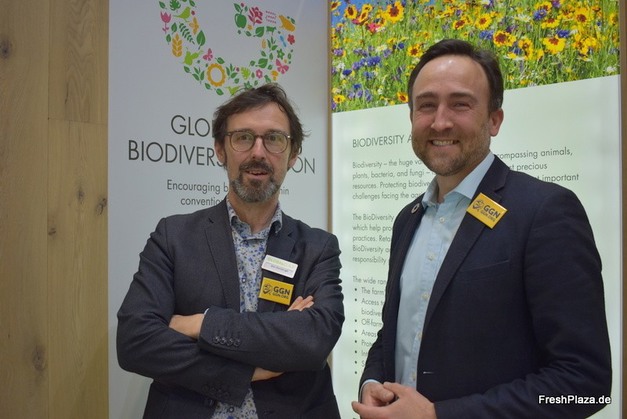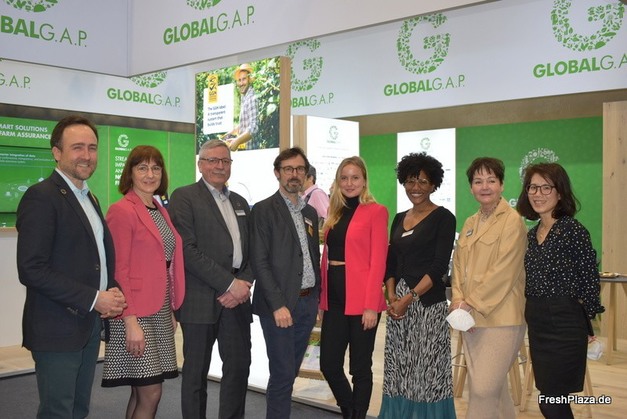GLOBALG.A.P.’ s certification system is used in over 130 countries and is often described as the most widely adopted farm quality assurance in the fresh produce sector. We spoke with Senior Technical Expert René Capote and Team Leader of Key Account & Membership Management, Ben Horsbrugh, about GLOBALG.A.P’s certification processes, as well as biodiversity, sustainability and the role of multistakeholder processes.
Intense teamwork in processes
"Maintaining biodiversity and sustainability requires a lot of teamwork. As a product developer, part of my job is to cooperatively align the interests and ideas from our stakeholders with the appropriate technology, and that everyone ends up on the same page," Capote says. "We help the working groups define and write down their respective requirements." Stakeholders, in this case, refer to retailers, producers, NGOs, and even scientists who are involved in the standards development process.

Ben Horsbrugh (left) and René Capote (right) in front of the new Biodiversity add-on to promote biodiversity in conventional fruit and vegetable production. The new add-on is planned to be launched for all market participants in the first half of 2022. It marks a cooperation between GLOBALG.A.P. and Lidl.
When asked how the company dealt with the regional differences in each case, Capote replies: "One approach that I have come to know and appreciate at GLOBALG.A.P. is ‘Think globally, act locally’. This means that while the standards generally cover a global scope, we must also be mindful of national policies that govern how the standards are interpreted. So, the certifications can be adapted to local conditions."
Local initiatives
Horsbrugh sees new groups emerging in this regard, "In the next two to three years, there will probably be lots of local initiatives. This is because there are many urgent issues that need to be addressed at the regional level. We also have to accept that there is a plethora of standards that need to merge and harmonize to ultimately decide which ones will be the best and how we can interact with them. Until there are definitive standards, this is our way of dealing with different ideals and ideas."
As for whether the standards set by certification companies like GLOBALG.A.P. couldn't be achieved on a regional level, Horsbrugh says: "That's a core challenge we face all the time, which is kind of squaring the sustainability circle; we have clear market demands and clear inherent needs in terms of sustainability. That's our daily work. Behind the development of these standards is the work of many people who perform at a high level and bear a lot of responsibility. For example, individual programs often involve between 30 and 40 people. Standards and certifications only work if all these people are behind them."
Capote adds: "I think the key is to rely on multi-stakeholder governance or multi-stakeholder processes, because in order to develop the standards, there is a level of stakeholders, which is NGOs, retailers and producers. This is to ensure that there is appropriate transparency and good development within the process."
In addition, he said, it is also important to include the findings of research organizations. "The NGOs and the research organizations are sometimes the most vocal stakeholders, for example, on what is the most developed science-based state of the art. But these also need to be applicable at the operational level, as well as cost-effective and also linked to the market. Once these standards are established and accepted by retailers and growers, they will be implemented accordingly."
Impact of the pandemic on certification procedures
Horsbrugh says: "During the pandemic, we managed to quickly develop remote solutions that were accepted by the market, so we were able to implement a certification process that was developed within three months. At the beginning of the pandemic, there was a fear that the focus would be lost in terms of sustainability, but the opposite was the case. We actually had more discussions about sustainability, with all kinds of stakeholders proactively approaching us. It was a great privilege for GlobalG.A.P. to be part of a core business during the pandemic. Also, because most of us were already widely networked and structured accordingly, this wasn't too much of a change for us either."

The market is currently more volatile than ever, Horsbrugh says. "Disruptions in the supply chain will definitely affect our stakeholders, but not directly GLOBALG.A.P. So we also have to be sensitive to the situation of growers and retailers who have to deal with different prices."
Capote: "In addition, the higher demand for smart solutions, meaning digital tools as well as digital services in general and social standards was very high." He additionally spoke of the need and the importance to respond appropriately to the latest ICPP report on climate change.
Horsbrugh described the issue of sustainability as a "no-brainer" within the industry as a whole, as it is now a given to work sustainably, while Capote stressed that there is a certain urgency in the next two to three years. This is because it is during this period that the technology that will shape the world in 2050 will be decided.
This year, GLOBALG.A.P. will launch the revised version of its IFA V6 program, offering streamlined, intuitive, and digitalized solutions for the entire sector, as well as the GRASP 2.0 social standard and the TR4 program for the banana industry: "This is a tool that provides farmers with a risk mitigation plan to prevent the introduction (and/or further spreading) of the TR4 pathogen to, within, and from their GLOBALG.A.P. certified farms and that represents the best complementary solution we have to date."
For more information:
Dr. René Capote und Ben Horsbrugh
GLOBALG.A.P. / FoodPLUS GmbH
Tel: +49 221 57776 -0
Email: [email protected]
www.globalgap.org
